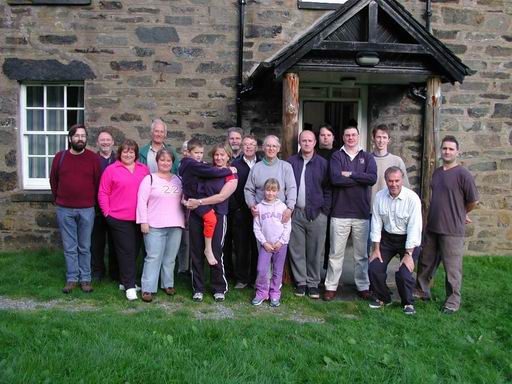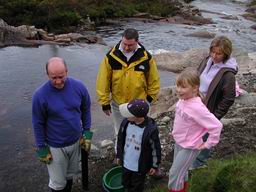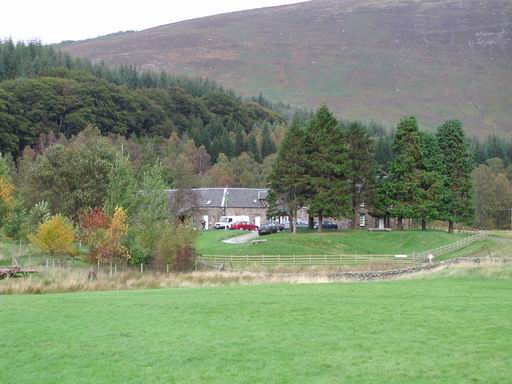Glen Lyon Astronomy Weekend 2002

To say Glen Lyon is remote is an understatement; however, this means total darkness and not the usual yellow glow we have all come to expect. The terrain is dotted with sheep and other hardy wildlife like toffee cows and, of course, astronomers.
Friday night started with buffet refreshments for everyone followed by a talk by Bill Ward titled Snap, Crackle and Pop the Natural Sounds of the Earth at VLF. Bill then proceeded to introduce us to 'spherics which were caused in our atmosphere by lightning. We listened to various sound bytes including Whistlers, Chorus and Tweaks, which culminated in the statement:..our world is never silent! Do we realise that after witnessing an aurora, sounds which resemble bird calls in the jungle, takes place? This is called a Chorus. Bill then invited us to join him about a couple of miles away in order to listen to the 'spherics which were taking place at that time. A few of us went along, and using a piece of equipment he had built himself, we did indeed hear whistlers and chorus for ourselves and Bill was able to record them himself for the very first time, so success all round for everyone.
Unfortunately, Friday night did not present the opportunity for some visual astronomy due to clouds which were strangely silhouetted by what we thought was star glow due to the haziness in the sky.

Panning for gold
On Saturday, everyone was free to do as they wished after breakfast. This included walking, panning for gold (successfully may I add) and catching up on some sleep. A few of us had witnessed the wonderful aurora displays a couple of nights before and had therefore not had any sleep! These aurorae had also been seen by the local café/post office owner who had been trying to explain to the locals about the display. Unfortunately, they had not witnessed it and he was glad to be able to confirm what it was he actually saw.
By 5.00pm everyone had congregated back at the centre for a slide show given by Ian Glen an AFA mountaineering member. This included his wonderful pictures from his trips to Mount Everest base camp and included Kathmandu and Nepal. The scenery was absolutely breathtaking and various slides of the locals depicted a very happy race despite not having materialistic wealth like us. Ian also showed the dangers involved in such a trip like hypothermia and altitude sickness which unfortunately costs so many lives every year.
After dinner, Douglas Cooper then gave an interesting talk on gravity and how the earth's weight was calculated by the experiments carried out in 1774 by Rev. Nevil Maskelyne, 5th Astronomer Royal, on Schiehallion which was about 5 miles from where we were. This magnificent and little known breakthrough was celebrated by a plaque erected at the base of the hill stating what had actually gone on at the time. Douglas showed us how the experiment was carried out at the time despite not having the technology that we have now.

Meggernie Outdoor Centre
As the skies remained cloudy, Neil Grubb showed some web cam images of the Moon, Jupiter and Saturn, demonstrating the difference good and bad seeing can have on these images. Russell Cockman gave a slide show of his recent work, in particular aurora shots from the night before. Rainbows, sundogs and a cracking solar pillar featured in this show alongside spectacular Milky Way photographs taken from the Canary Islands. Last but not least Horst Meyerdierks showed a video of the occultation of Saturn earlier in the year. He also gave us an insight into his very methodical and professional style of observing reports which he keeps up to date, a great example for others to follow.
We then watched a film and partook of a small refreshment before retiring. The skies did actually clear in the wee small hours for a few still awake to see Saturn and Jupiter amongst other objects.
As Sunday was our going home day, we tidied up and had time to look at the Sun through Martin's telescope and filter which clearly showed sunspots. The traditional group photo was then taken before setting off home.
All in all, the weekend was very good and despite not having clear skies, a lot of topics were covered and it didn't rain either. The location of Glen Lyon is beautiful and ideal for astronomy purposes. Also the weekend was not possible without the help of everyone who contributed, from talks, slides and helping with the catering and washing up. It was very much a group effort and we thank everyone for attending.